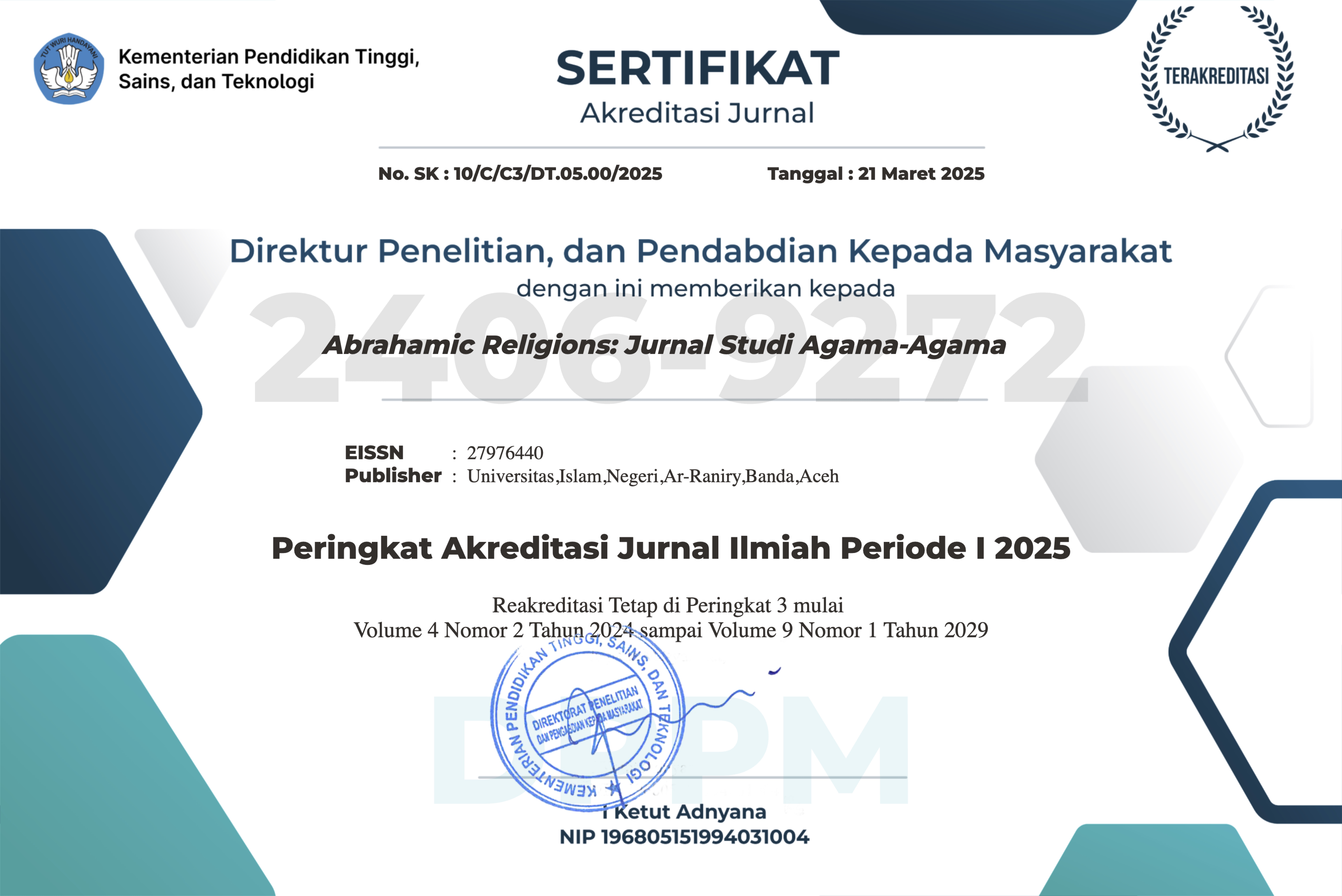Religious Pluralism and Tolerance in Sibolga: Challenges and Solutions in a Multicultural Society
DOI:
https://doi.org/10.22373/arj.v5i2.32162Keywords:
Sibolga, Religious Pluralism, Tolerance, Multicultural Society, Local WisdomAbstract
Sibolga is a coastal city in Indonesia characterized by high ethnic and religious diversity, shaped by a long history of trade, migration, and cultural exchange. This study aims to examine how religious pluralism is managed and the challenges of tolerance in a multicultural society. Using a qualitative method through literature review and interviews, the research identifies two main realities: the potential for harmony through values of mutual cooperation, deliberation, and the local motto “berbilang kaum, satu tujuan” (“many groups, one goal”), as well as vulnerabilities caused by issues of ethnicity and religion (SARA), radicalism, economic inequality, and the politicization of religion. The findings highlight four strategies for strengthening tolerance: multicultural education, structured interfaith dialogue, the role of local leaders as mediators, and the revitalization of cultural values. The novelty of this research lies in its emphasis on solutions grounded in the social practices of Sibolga’s community, making it an adaptive model with potential for replication in other multicultural regions of Indonesia.
References
Busro, Aitiya Hari ananda, A. S. T. (2019a). Moderasi Islam (Wasathiyyah) Di Tengah Pluralisme Agama Indonesia. FUADUNA: Jurnal Kajian Kegamaan Dan Kemasyarakatan, 03(213). https://doi.org/. https://doi.org/10.22373/jiif.v13i2.72
Busro, Aitiya Hari ananda, A. S. T. (2019b). MODERASI ISLAM (WASATHIYYAH) DI TENGAH PLURALISME AGAMA INDONESIA. FUADUNA: Jurnal Kajian Kegamaan Dan Kemasyarakatan, 03, 213. https://doi.org/10.22373/jiif.v13i2.72
Eleazer Nendissa, J., Henry Simamora, R., Magdalena Rotua, D., Guntar Wijaya Baringbing, P., Farneyanan, S., & Tinggi Teologi Transformasi Indonesia Manado, S. (2024). Pluralisme Agama-Agama: Tantangan, Peluang, dan Perspektif Teologis Dalam Membangun Kerukunan Umat Beragama di Indonesia. SAMI: Jurnal Sosial Agama Dan Teologi Indonesia, 2(2), 156.
Khairul Fatah. (2018). Diskursus dan Kritik Terhadap Teologi Pluralisme Agama di Indonesia. Jurnal: MIQOT, 12(1).
Pemerintah Kota Sibolga. (2023). Profil Kota Sibolga. Pemkot Sibolga.
Robert W Hefner. (2011). Civil Islam: Muslims and Democratization in Indonesia. Princeton. Princeton University Press.
Wahyudi Teguh. (2020). Media Sosial dan Toleransi di Masyarakat Multikultural. Jurnal Komunikasi, 12(2).
Yasin, A., & Rahmadian, M. I. (2024). Strategi Pendidikan Agama Islam dalam Menghadapi Tantangan Pluralisme Agama di Masyarakat Multikultural. Aksiologi : Jurnal Pendidikan Dan Ilmu Sosial. https://doi.org/https://doi.org/10.47134/aksiologi.v5i1.208
Yasin, A., & Rahmadian, M. I. (2024). Strategi Pendidikan Agama Islam dalam Menghadapi Tantangan Pluralisme Agama di Masyarakat Multikultural. Aksiologi : Jurnal Pendidikan Dan Ilmu Sosial, 44–54. https://doi.org/10.47134/aksiologi.v5i1.208
Yusdani. (2019). Toleransi Beragama dalam Perspektif Filsafat Hukum Islam". Al-Mawarid: Jurnal Hukum Islam, 19(1).
Downloads
Published
Issue
Section
License
Copyright (c) 2025 Nanda Sekti Prayetno, Ira Novita Sari

This work is licensed under a Creative Commons Attribution-ShareAlike 4.0 International License.
Authors who publish in this Journal agree to the following terms:
- Authors retain copyright and grant the journal right of first publication with the work simultaneously licensed under Attribution-ShareAlike 4.0 International (CC BY-SA 4.0) allows others to share the work with an acknowledgment of the work's authorship and initial publication in this journal.
- Authors are able to enter into separate, additional contractual arrangements for the non-exclusive distribution of the journal's published version of the work (e.g., post it to an institutional repository or publish it in a book), with an acknowledgment of its initial publication in this journal.
- Authors are permitted and encouraged to post their work online (e.g., in institutional repositories or on their website) prior to and during the submission process, as it can lead to productive exchanges, as well as earlier and greater citation of published work. (See The Effect of Open Acces)















